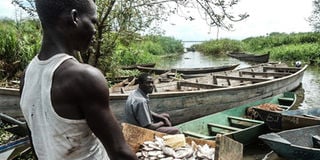Food shortage: Locals resort to illegal fishing

Economic activity. Fishermen preparing to go for fishing at Kayei Landing Site on the shores of Lake Kyoga last year. File Photo
Food scarcity has forced locals in the surrounding districts of Lake Kyoga to engage in illegal fishing despite the ban imposed by government in 2019.
As a result, some residents have died in the process. Since January 2020, more than 10 people have lost their lives in Lake Kyoga, according to Mr Denis Rembo Ongu, the Namasale Parish chairperson.
The latest victims are Brian Ogwok, 22, and Tom Awongo, who died on April 5 while using an improvised wooden boat to catch fish. The boat reportedly capsized.
The youngsters are residents of Acaba Village, Amai Parish, Aputi Sub-county in Amolatar District.
Amolatar, with a population of more than 140,000 people, is currently grappling with famine caused by the prolonged dry spell.
“Because of hunger, residents are now being tempted to go and catch the fish,” Mr Ongu said on Wednesday.
He said the disaster is compounded by the increase in food prices with a kilogramme of beans now being sold at Shs5,000 in Namasale Parish.
“What they (residents) are doing now is barter trade because when they manage to catch about three or four big fish, they exchange it with a kilogramme of beans,” Mr Ongu said.
He said residents are also using rudimentary methods like sitting on jerrycans to access the lake while others are catching fish at the lakeshores using hooks and spears.
The north Kyoga regional police spokesperson, Mr Michael Odongo, said he was only aware of the one incident that occurred last week, where two people drowned in Lake Kyoga.
“It could be true many fishermen have died because they are doing illegal activities in the lake and whenever such incidents happen, they fear reporting to authorities,” he said.
Mr Roggers Akena, a resident of Oparamo Village, Akokoro Sub-county in Apac District, said fishermen who remained jobless after government suspended fishing activities on Lake Kyoga have resorted to farming.
“Some people don’t have food in their houses, some are now risking their lives in the lake to look for food,” he said.
Suspending fishing
In April 2019, government through the Ministry of Agriculture, Animal Industry and Fisheries suspended all fishing activities on Lake Kyoga to allow the depleted fish species multiply.
Accordingly, leaders in the districts around Lake Kyoga under Lake Kyoga Integrated Management Organisation (LAKIMO) suspended fishing activities for two months.
This was also geared at allowing the Fisheries Protection Unit (FPU) to coordinate the registration of fishermen and their boats with the aim of regulating fishing activities.
However, many residents have violated the ban and continued with illegal fishing.




